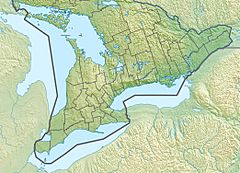Sixteen Mile Creek (Niagara Region) facts for kids
Quick facts for kids Sixteen Mile Creek |
|
|---|---|
|
Location of the mouth of Sixteen Mile Creek in southern Ontario
|
|
| Country | Canada |
| Province | Ontario |
| Region | Southern Ontario |
| Regional Municipality | Niagara |
| Municipalities |
|
| Physical characteristics | |
| Main source | Field West Lincoln 182 m (597 ft) 43°03′41″N 79°31′26″W / 43.06139°N 79.52389°W |
| River mouth | Sixteen Mile Creek Pond at Lake Ontario Lincoln 74 m (243 ft) 43°09′34″N 79°20′02″W / 43.15944°N 79.33389°W |
| Basin features | |
| River system | Great Lakes Basin |
Sixteen Mile Creek is a cool stream in Southern Ontario, Canada. It flows through three towns: Lincoln, Pelham, and West Lincoln. This creek is part of the huge Great Lakes Basin. It starts high up on the Niagara Escarpment and ends its journey in Sixteen Mile Pond, which then flows into Lake Ontario.
Contents
Exploring Sixteen Mile Creek
Sixteen Mile Creek is more than just a stream. It's an important natural feature in the Regional Municipality of Niagara. It helps carry water from the land to Lake Ontario. This creek is a home for many plants and animals.
Where Does the Creek Flow?
The creek begins in a field in West Lincoln. This is its "source" or starting point. From there, it travels downhill. It crosses through different landscapes. Finally, it reaches Lake Ontario. The place where it meets the lake is called its "mouth."
From Escarpment to Lake
The creek's journey is quite interesting. It starts at the Niagara Escarpment. This is a long cliff-like ridge. The water then flows down towards Lake Ontario. This path helps shape the land around it. It also creates different habitats.
Protecting the Creek
The Niagara Peninsula Conservation Authority helps take care of Sixteen Mile Creek. They work to keep the water clean. They also protect the land around the creek. This group checks on the creek's health regularly.
Creek's Health Report Card
In 2012, the Conservation Authority gave the creek a "report card." This report looked at the creek's "watershed." A watershed is all the land that drains into a specific body of water. The creek got a grade of D for its water quality. It also got a D for its forest cover. These grades show that there's work to do. They want to make the creek even healthier.
Why is a Healthy Creek Important?
A healthy creek means clean water for everyone. It also means a good home for wildlife. When forests grow along the creek, they help filter the water. They also prevent soil from washing away. This keeps the creek clean and clear.
Wildlife in the Creek
Sixteen Mile Creek is home to various creatures. Fish swim in its waters. Birds fly overhead and look for food. Small animals like frogs and insects also live near the creek. Protecting the creek helps all these animals thrive.
What Animals Might You See?
You might spot different types of fish. Some birds, like ducks or herons, visit the creek. They often look for fish or insects to eat. Keep an eye out for turtles basking in the sun. You might even see small mammals near the banks.
Plants Along the Banks
Many plants grow along the creek's edges. These plants are important. They help hold the soil in place. They also provide shelter for animals. Some plants help clean the water naturally. They are a vital part of the creek's ecosystem.
Fun Facts About Creeks
- Creeks are smaller than rivers. They are like tiny rivers.
- They often flow into larger bodies of water. This could be a river, a lake, or even an ocean.
- Creeks help move water from the land to the sea. This is part of the Earth's water cycle.
- Many animals depend on creeks for their survival. They use the water for drinking and finding food.
- People also enjoy creeks for activities like fishing or hiking.


